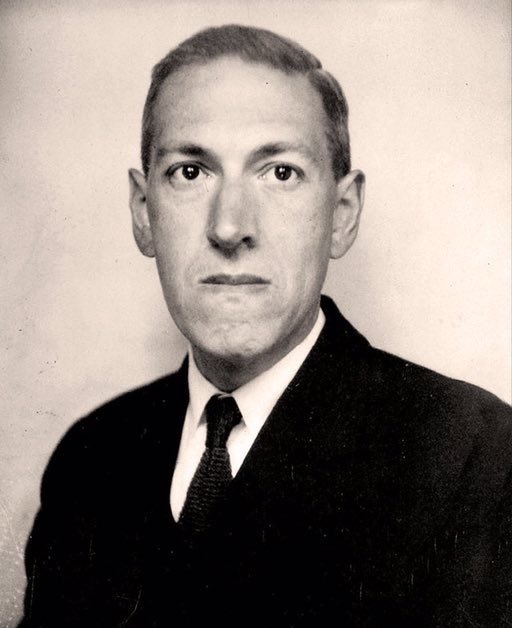Frases célebres de Howard Phillips Lovecraft
“El lugar lógico para encontrar una voz de otros tiempos es un cementerio de otros tiempos.”
En las montañas de la locura, capítulo 10.
Frases de vida de Howard Phillips Lovecraft
Celephaïs
The Shadow Out of Time
Frases de mundo de Howard Phillips Lovecraft
La llamada de Cthulhu
La llamada de Cthulhu: Incluye los relatos "La historia del Necronomicón" y "Azathoth"
Howard Phillips Lovecraft Frases y Citas
“En épocas extrañas hasta la muerte puede morir.”
At the Mountains of Madness and Other Tales of Terror
The Dunwich Horror and Others
Variante: Los hombres de más amplio intelecto saben que no existe una verdadera distinción entre lo real y lo irreal; que todas las cosas aparecen tal como son tan sólo en virtud de los frágiles sentidos físicos y mentales mediante los que las percibimos; pero el prosaico materialismo de la mayoría tacha de locuras a los destellos de clarividencia que traspasan el vulgar velo del empirismo soez
The Outsider
Howard Phillips Lovecraft: Frases en inglés
Letter to Robert E. Howard (7 November 1932), in Selected Letters 1932-1934 edited by August Derleth and Donald Wandrei, p. 102
Non-Fiction, Letters
Letter to Elizabeth Toldridge (9 October 1931), in Selected Letters III, 1929-1931 edited by August Derleth and Donald Wandrei, p. 423
Non-Fiction, Letters
Orignially written as part of an "Essay on Modern Poets" this was published as a "Fragment on Whitman” (c. 1912) in The Ancient Track (2001) edited by S. T. Joshi, p. 192
Non-Fiction
Letter to Reinhardt Kleiner (7 March 1920), in Selected Letters I, 1911-1924 edited by August Derleth and Donald Wandrei, p. 110
Non-Fiction, Letters
Letter to James F. Morton (10 February 1923), published in Selected Letters Vol. I (1965), p. 208
Non-Fiction, Letters, to James Ferdinand Morton, Jr.
the scattered plasticity of that nameless sky-spawn was nebulously recombining in its hateful original form...
Fiction, The Call of Cthulhu (1926)
The Allowable Rhyme (1915)
Non-Fiction
Letter to James F. Morton (6 November 1930), in Selected Letters III, 1929-1931 edited by August Derleth and Donald Wandrei, p. 207
Non-Fiction, Letters, to James Ferdinand Morton, Jr.
Fiction, The Crawling Chaos (1921)
"Pickman's Model " - written 1926; first published in Weird Tales, Vol. 10, No. 4 (October 1927)
Fiction
Response to observations made in In A Minor Key by Charles D. Isaacson, in The Conservative, Vol. I, No. 2, (1915), p. 4
Non-Fiction
"Facts Concerning the Late Arthur Jermyn and His Family" - written 1920; first published in The Wolverine, No. 9 (March 1921)
Fiction
Fiction, The Other Gods (1921)
At the Root (1918)
Non-Fiction
"Imprisoned with the Pharaohs" - Written February 1924, published May-June-July 1924 in Weird Tales
Fiction
Letter to Frank Belknap Long (27 February 1931), in Selected Letters III, 1929-1931 edited by August Derleth and Donald Wandrei, p. 293
Non-Fiction, Letters, to Frank Belknap Long
Attributed to Lovecraft by Harold Farnese, who corresponded with Lovecraft briefly, later presented by August Derleth as a direct quote; but as discussed on this page http://www.hplovecraft.com/life/myths.aspx#blackmagic, Farnese's letters to Derleth suggested he tended to paraphrase things Lovecraft had written to him, going by memory rather than referring to letters he had on hand. More details in "The Origin of Lovecraft’s 'Black Magic' Quote" by David E. Schultz, *Crypt of Cthulhu*, issue 48.
Disputed
Letter to Jennie K. Plaiser (8 July 1936), quoted in "H.P. Lovecraft, a Life" by S.T. Joshi, p. 564
Non-Fiction, Letters
“Disintegration is quite painless, I assure you.”
"From Beyond"
Fiction
“We must stop thinking primarily in terms of “money” and “business””
both artificial things—and begin to think increasingly in terms of the actual resources and products on which “money” and “business” are based. In terms of these, of the human beings to whom they are to be distributed, and of the cognate human values which make the accidents of life and consciousness worth enduring.
"Some Repetitions on the Times", (1933). Reprinted in Miscellaneous Writings, edited by S.T. Joshi. Arkham House, 1995.
Non-Fiction
